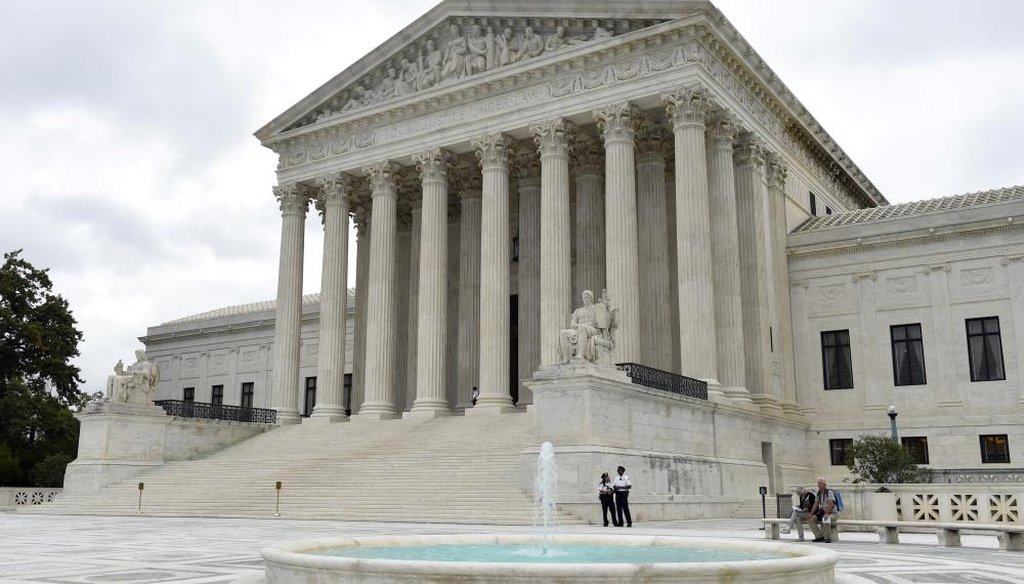Get PolitiFact in your inbox.

The Supreme Court. (AP)
The U.S. Supreme Court could gut President Barack Obama’s signature health care law over four simple words, "established by the state." What does it mean? Our PolitiFact Sheet on King vs. Burwell explains.
THE TOP LINE
Health insurance subsidies for millions of Americans are at stake.
The 2010 Affordable Care Act requires most Americans to have health insurance as a way to drive down health care costs.
The law envisioned making health insurance more affordable by, in part, allowing consumers to shop for plans in an online marketplace, allowing them to compare rates for plans offered by several private companies in one place. Sixteen states decided to set up their own health insurance marketplaces. The majority did not, and by default, were placed into a federally run marketplace, Healthcare.gov.
Not everyone who received a plan from the marketplace (or sometimes called exchange) has to pay the full cost of their health insurance. Roughly 6.4 million on the federal exchange in 34 states qualified for subsidies based on their income from the government to offset the cost.
Those subsidies are being challenged as illegal based on the wording of the Affordable Care Act.
Under one model by the Rand Corporation, about 8 million people could end up losing health insurance if the court agrees that the subsidies are illegal, even more than the number of people who currently receive federal subsidies.
THE DETAILS
The latest legal controversy comes down to one phrase in the law.
The argument pursued by plaintiffs in King vs. Burwell is simple: It is illegal for the government to award subsidies to people who bought plans through federal exchanges —because the law doesn’t allow it.
The law states that the subsidies can be awarded in marketplaces "established by the state" (page 61).
Supporters of the Affordable Care Act say no one intended for subsidies to be limited to the state exchanges. Obama said this should be "an easy case" for the Supreme Court, and the federal government has argued that the rules developed for marketplace subsidies should clearly apply to residents whose states chose for the federal government to operate their exchange. In that way, the Department of Health and Human Services acts as a stand-in for the state.
But the petitioners in King vs. Burwell — Virginia residents led by David King — disagree. (Burwell refers to Sylvia Burwell, the current secretary of Health and Human Services.)
As part of the health care law, people who would have to spend more than 8 percent of their income on health insurance are exempt. That exemption would cover King, if not for the tax subsidies provided in the federal marketplace that make him eligible.
THE EFFECT ON YOU
If the Supreme Court decides the subsidies for plans purchased through the federal exchanges are illegal, the financial consequences could extend beyond the buyers who receive subsidies.
Rand health economist Christine Eibner says two more groups would see increased costs: federal exchange planholders who do not receive subsidies and people who purchase ACA-compliant, private insurance through the individual market.
These groups share a single risk pool that balances costs for people of various ages and health conditions. The pool benefits from younger, healthier recipients that help to lower prices, many of whom receive subsidies, like the rest of Healthcare.gov buyers. But the younger users may decide health insurance is not worth it for them without the subsidies and leave the pool.
"If you’re in a state with its own exchange, you’re likely protected either way," Eibner said.
THE BIG PICTURE
The individual mandate could lose its teeth.
This decision could reduce the power of the individual mandate, the health care law’s centerpiece that requires most people to carry health insurance and survived a court challenge of its own in 2012, in the states using the federal exchange.
The collapse of the federal subsidy structure could increase premiums nationwide. That, in turn, would send insurance costs beyond the 8 percent income threshold and exempt millions more from having to purchase insurance.
The decision could also weaken the employer mandate, which hits businesses with a tax penalty when employees receive subsidies for coverage on a government-run exchange.
The employer mandate only comes into place for workers who receive subsidies through the exchanges. "So if there is no ability to receive a credit, the (employer) mandate can’t be triggered," Eibner said.
Our Sources
Interview with Christine Eibner, Rand Corporation health economist, June 12, 2015
Interview with Gail Wilensky, Project HOPE senior fellow and economist, June 11, 2015
Rand Corporation, "Eliminating Health Insurance Subsidies Will Boost Costs, Cause Millions to Drop Coverage," Jan. 8, 2015
Government Publishing Office, Affordable Care Act text, March 23, 2010








































